How the developers procedurally created a bunch of "junk" mobile games and earned 50 thousand dollars
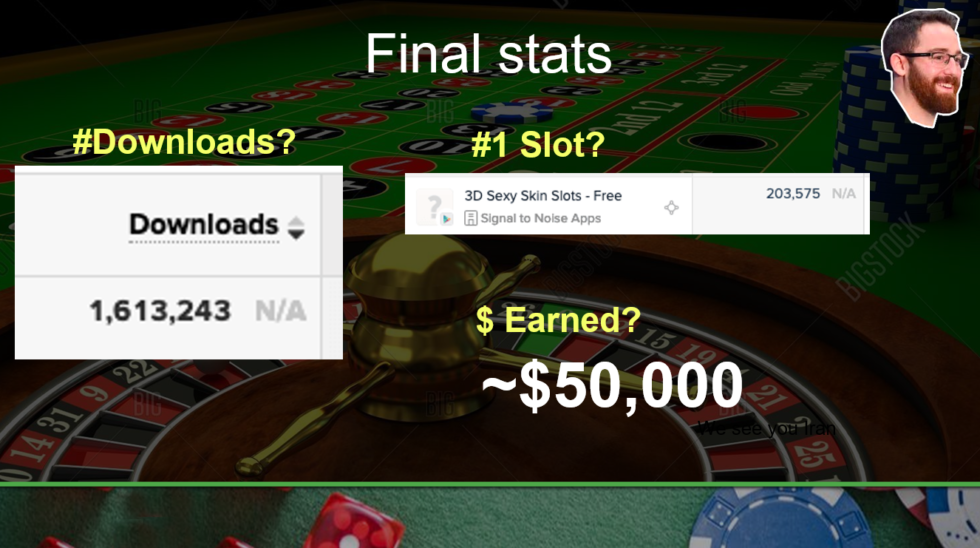
Two indie developers tell how they used automation, one Google Play account and the only game template about slot machines to create and publish more than a thousand applications.
At the Game Developers Conference held this year, two game developers were able to write a new chapter of the dystopian novel about the future: they told a story about how they made money by letting the robots do all the work. In their case, this work was procedural generation of games for smartphones.
Participation in the usual game jam led to the creation of a data processing machine, which as a result managed to earn a decent amount: 50 thousand dollars for more than two years. Years later, having data (and money) on hand, the developers of this game-making machine, which created only “junk” slot machines with the free-to-play model, used GDC as a tribune to give an alarm signal to the industry, in which correct behavior is often limited to attention to the players, to ingratiate with the publishers and to collect positive reviews from critics. In the case of these developers, the violation of all these rules led to too successful results, causing them great discomfort.
')
Winning "race to the bottom"
Let's go back to 2013: at that time two video game developers have been trying for several years to succeed in the growing mobile gaming market. One of them, Alex Schwartz, helped create a quality mobile game Jack Lumber . (In a past life, I even wrote a good review of it in the already non-existent The Daily magazine, which worked only on tablets.) The second one, Ziba Scott, developed the nice mobile puzzle game Girls Like Robots .
Both games used the “pay once” model without microtransactions. Both received awards, fame, good reviews at exhibitions and found publishers. Both failed to succeed.
Both developers have estimated their modest income earned on the "right" way, laid out by traditional publishers. Then they looked at the iOS and Google Play stores and saw that “free games, clones and garbage” dominate there.
In one of the daily conversations about the realities of business, this duet concluded: "We can achieve better results ... by following the worst path!"
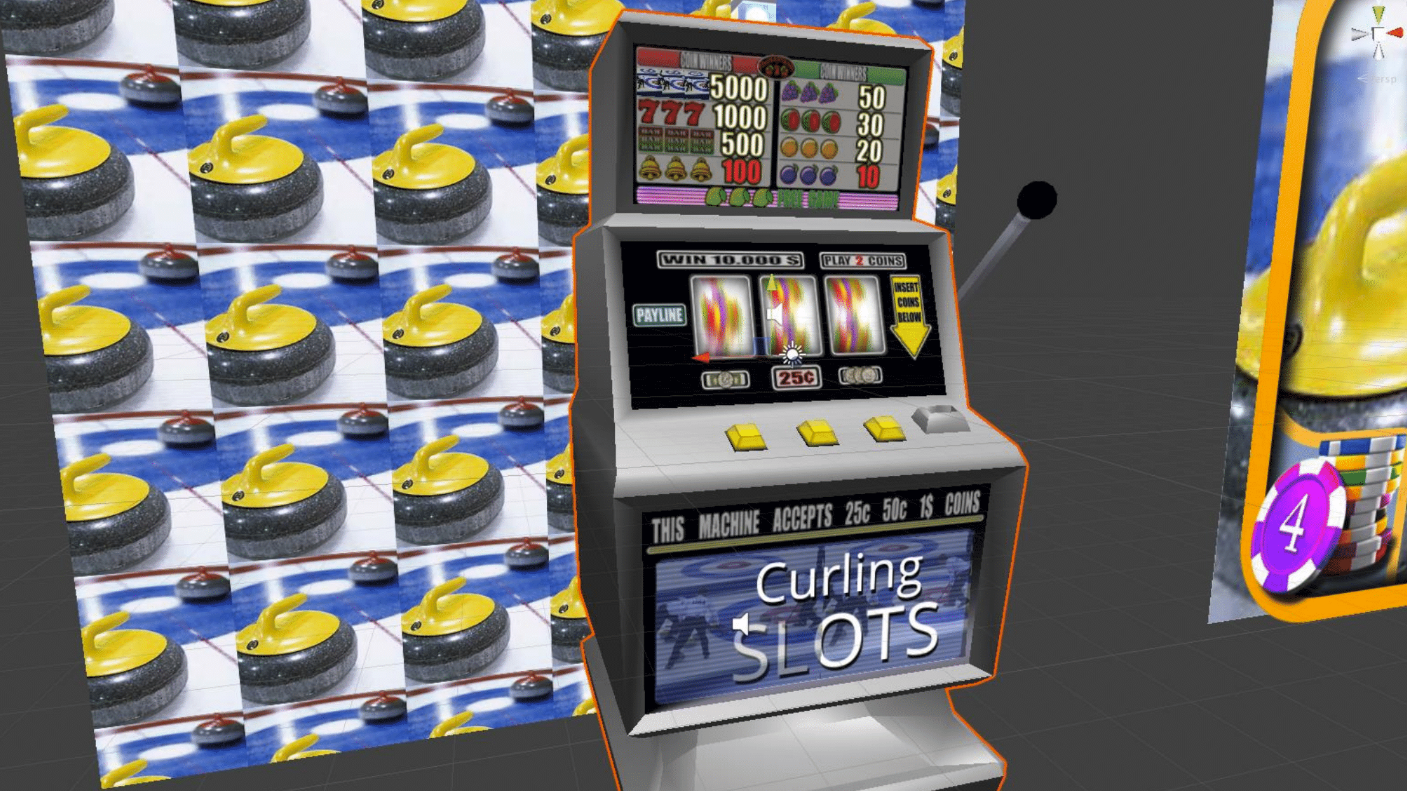
One example of the appearance of automatically generated slot machines for Android devices. All this was complemented by a text-to-speech song about curling, which was played at every jackpot.

Through the use of Selenium, the duo of developers was able to automate mouse clicks, data entry and selection of options needed to automatically download each game.
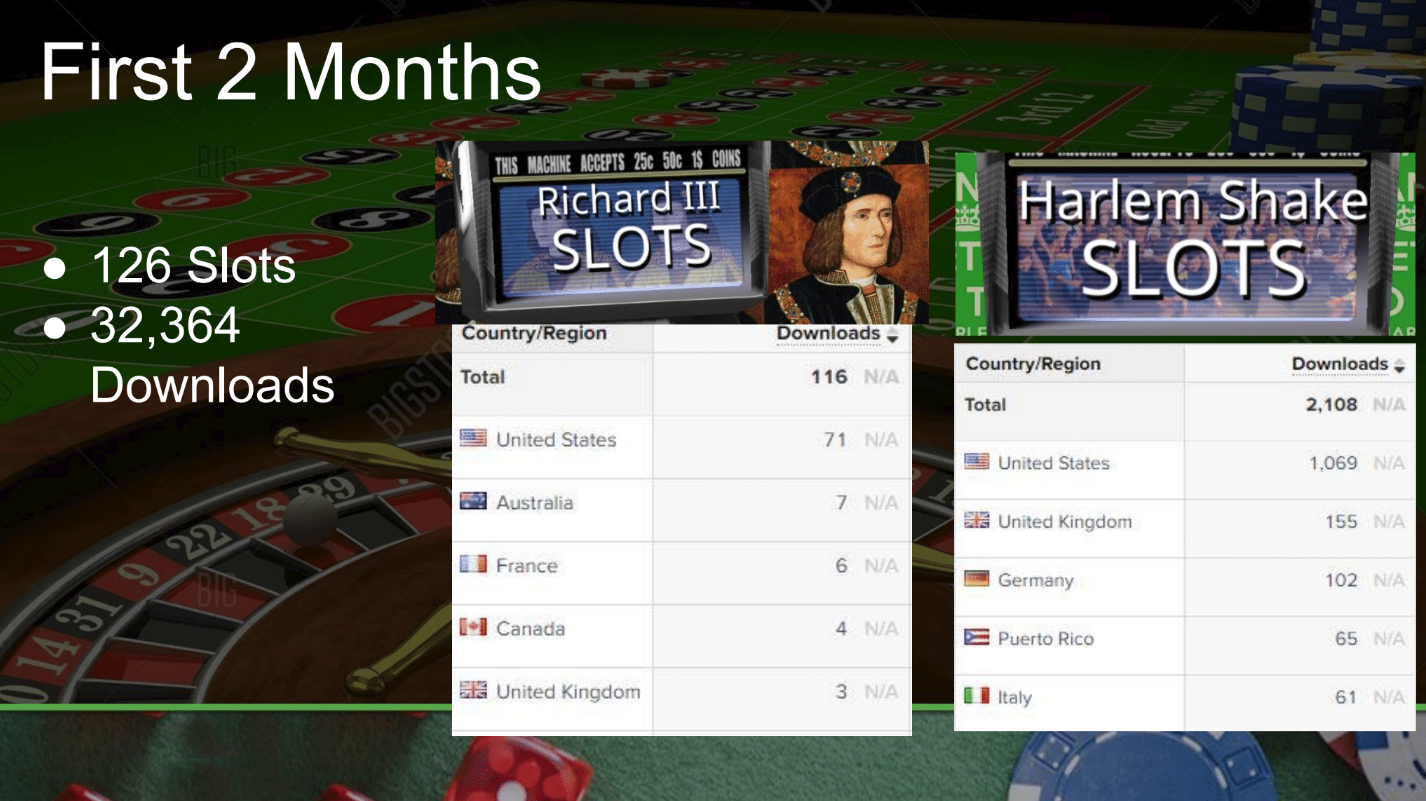
The first statistics.
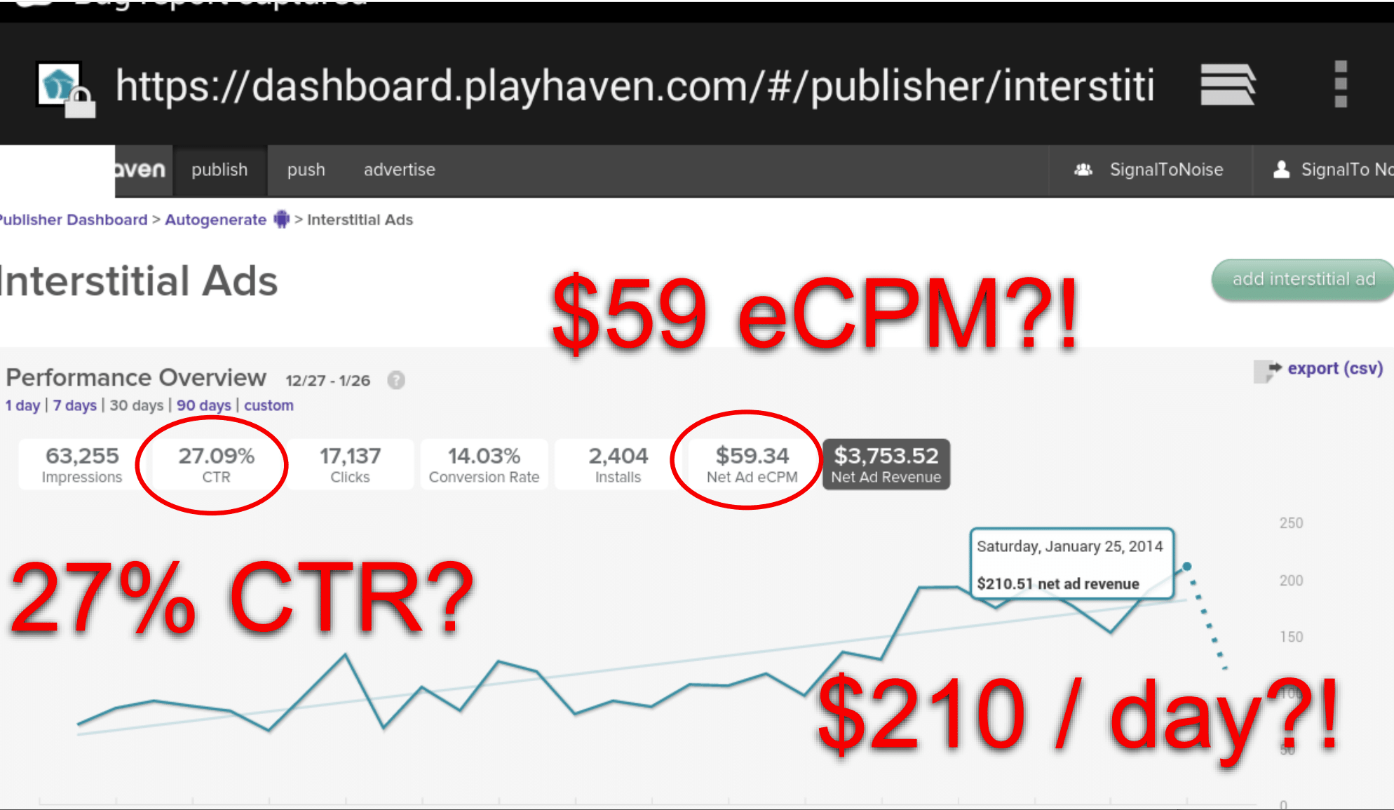
Surprise: these games make money.
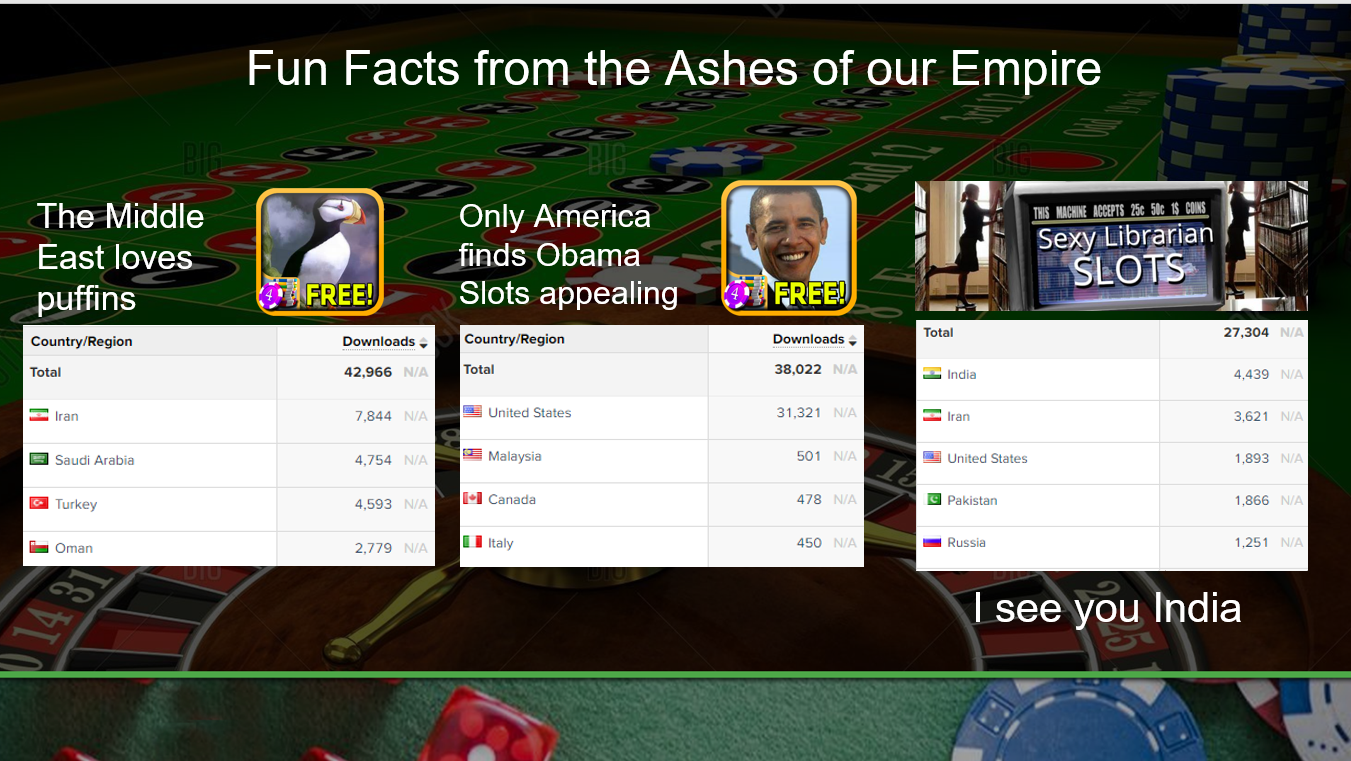
Some of the results obtained at the end of the experiment.
They joined forces during the Global Game Jam 2013. Schwartz and Scott conceived to create something resembling a “race to the bottom,” which they saw on mobile platforms. Due to the limited time allotted to the game jam, they decided to buy an asset three-dimensional slot machine from the Unity Store for $ 15 (this is a store that allows game developers to pay modelers and animators for the unlimited use of various two-dimensional and three-dimensional resources). They spent the remaining jam time to create a system that will automatically generate all the artwork needed for the simplest virtual slot machine to be unique enough for it to be published as its own smartphone application.
“Let's adapt them the way other slot machine developers do,” Schwartz suggested. “They create themed automata. What is the minimum set of items you need to change to get another slot machine? Change the name. Change one image on the drum, which can be associated with our theme. Let's say we make a slot machine about dolphins: place a dolphin [like the jackpot logo] with a special icon. The background will make the image of a dolphin with scrolling. "
The word list was created manually based on what seemed interesting to the development team; At the same time, the names should be fairly general and valid. The most daring of the titles was “3D Sexy Librarian Slots” (“3D Sexy Librarian”).
Having dealt with the graphics, the duo proceeded to the next step: creating their own music.
“A lousy music should be played in the game, and the text-to-speech mechanism should be singing the word“ dolphin ”in a monotonous Google Translate voice. It will be played every time the user wins. To the music she has to pronounce the name of our game, ”suggested Schwartz.
As a result, after pressing a single button, the Unity script was able to combine these steps and automatically generate hundreds of "unique" slot machines. Schwartz and Scott say that their automated system for collecting images in the public domain ran into one problem: Google Image Search gave errors about exceeding the request rate. “We had to use Bing,” Schwartz told us in a telephone interview. “Many aspects of his image search were less demanding. I'm not trying to insult someone, but this search engine has a second-class reputation. Therefore, for our project, he was in a sense a soul mate. ”
"Portal to a better world"
Having prepared the template for creating one-armed bandits, the team automated the process of transferring information to Google Play (at that time, it was much easier to operate than the iOS store) and creating free apps with ads. The process was completed after writing one simple Selenium script.
Now, developers could feed one keyword into the system of scripts that spent several hours on the assembly, and then observe in the “virtual monitor” how the system imitated human behavior: it placed flags, marked each country, agreed to terms of use and filled in all the text fields, and then took the automatically generated slot machine and loaded it into the store.
Schwartz and Scott connected Playhaven's mobile advertising network to the script system, because their philosophy was not to take real money from users who would download their apps with insane names. Then they simply “forgot” the project for two months. After working for some time in their real work, they decided to take a look at revenues and advertising statistics. The developers were amazed: people downloaded their apps, and 27 percent of these people clicked on their ads, making it about 211 dollars a day.
The team came up with a theory: “All our key advertising words were related to the casino,” Schwartz told us. “We thought about the reasons for such success, and it dawned on us: the game looked just awful, but people downloaded it for some reason. Then they saw an advertisement for a much better slot machine or casino, and clicked on it ... well, no wonder! In the neighboring meadow, the grass is always greener! The quality of our games was so low that these advertisements probably seemed to users to a better world. ”
Nevertheless, the duo of developers reluctantly admits that the average rating of many applications was approximately equal to four stars, and the reviews turned out to be quite favorable. Scott remembered one review of the automatically generated 3D Bowling Slots application: “The user wrote that he was disappointed that the bowling theme was poorly revealed in the slot machine”.
The true story of supervillains?

In the end it turned out a good amount of money.
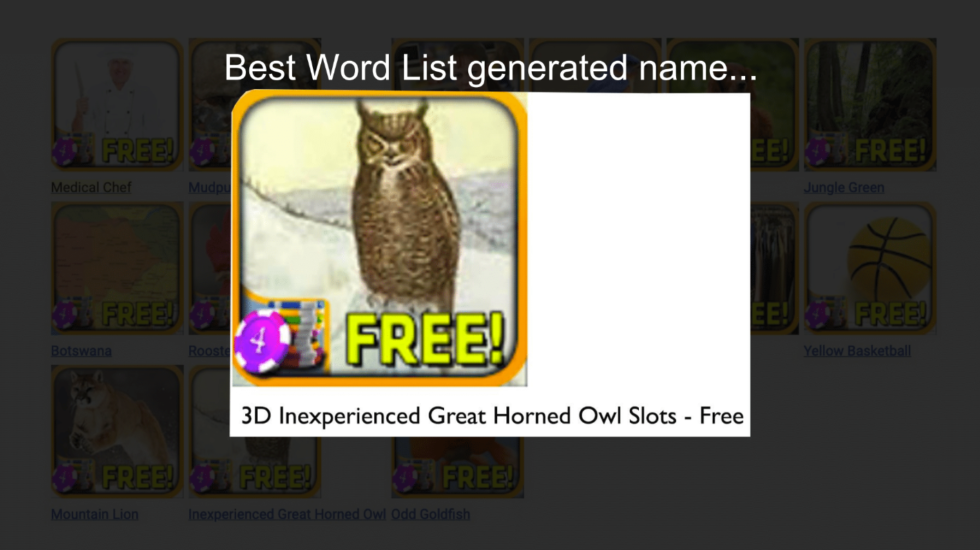
One of the most favorite developers of slot machines: "Slot machine inexperienced eared owl 3D"
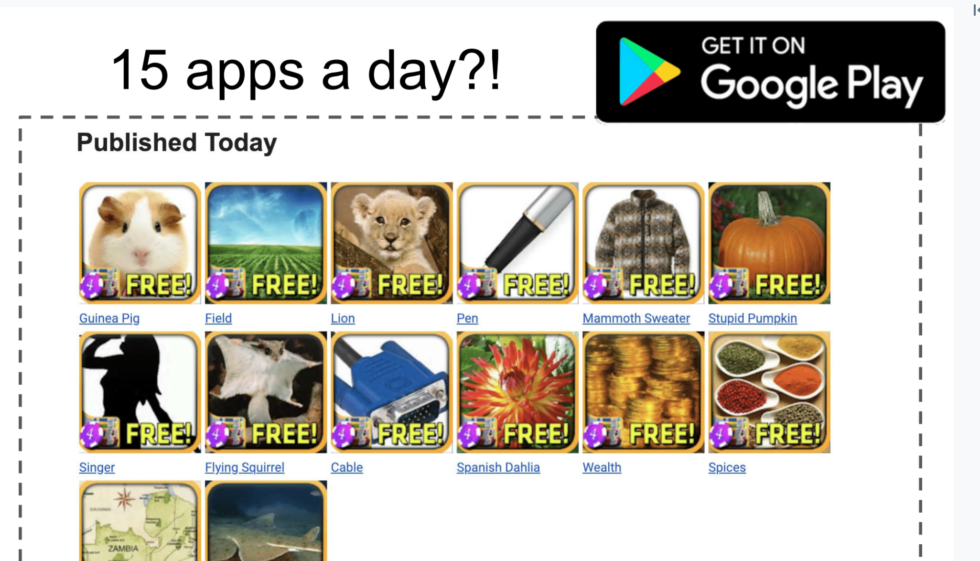
The automation system took into account the restriction on loading on Google Play (no more than 15 applications per day). It worked automatically for quite a long time and was able to download approximately 1,500 applications.

A slot machine template that the team eventually refused.
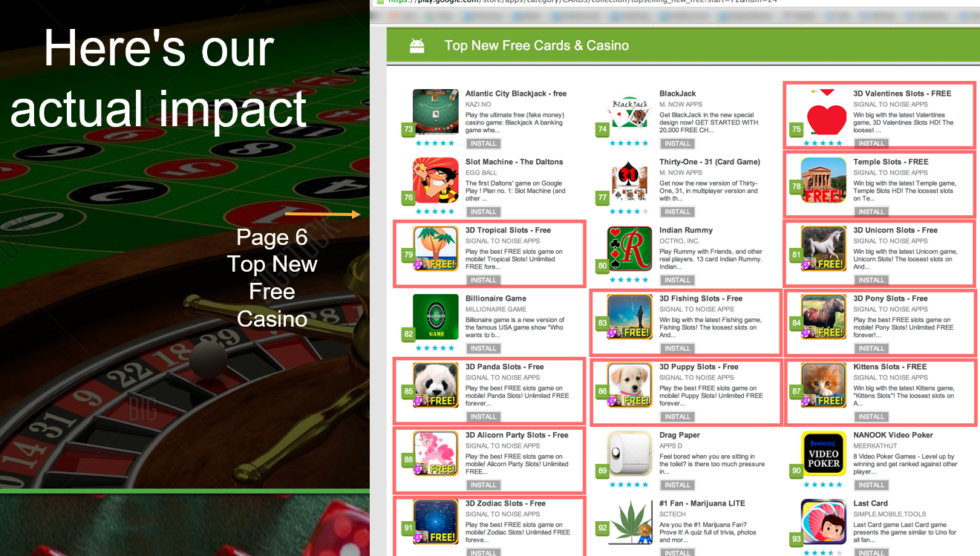
This is how much "popular" the developers have become (page 6 on request "best new card games and casinos").
The engineering part of their essence wanted to check how far this project could lead. Therefore, they began to experiment with the ready-made template, adding new elements to it, for example, automation of slot machine descriptions.
Google Trends was a good idea, but they usually led to the creation of trademark-protected names or celebrity names, and the developers were not interested in breaking the “automation” cycle to solve the problem of many requests for deleting applications. Therefore, they decided to use a slightly updated application name pattern: the word “3D”, plus an adjective, plus the name of an animal, place or country, plus the word “free”.
Examples of titles received: 3D Tremendous Face Pain Slots, 3D Rough Elbow Slots, 3D Mild Dogwood Slots, 3D Viceroy Butterfly Slots and 3D Inexperienced Great Horned Owl Slots. (Over time, the developers even bought T-shirts to capture the memory of the last name.)
Schwartz and Scott also paid some pennies to a small Romanian studio to create a better slot machine, which they refused as a result. This was partly due to the fact that the new permanent work and ethical considerations overcame their admiration and willingness to continue the experiment.
“Someone told us that you could make money on this idea, or sell data to someone, or sell your company,” Scott says. “We were at a crossroads - our joke began to resemble the real story of the supervillain. Will we leave all our creative aspirations to create an enterprise for actively making money on slot machines? Or will it remain a tiny part of our lives, taking 1/20 of the time? ”
Over time, the development team touched the problem of working with Google Play. Applications began to be removed for violating the updated terms of service, giving Google more freedom to destroy obvious garbage. In addition, Google quite regularly began to update the web interface. It was enough to shift the single flag by several pixels to break the entire Selenium script, which the team developed to automatically download 15 applications per day (at that time, this was the restriction of Google Play for one developer account).
At some point, Playhaven’s advertising network made an unequivocal statement. “We are seeing chaotic data in your account,” Schwartz retolds this letter. “We do not quite understand what is happening, and are not interested to publish ads in your slot machines anymore. But we need to clarify the situation: you do not violate our terms of use. It’s just a bit uncomfortable for us. ”
Then Playhaven added: “Your users are the worst. People coming from your apps don't spend money. ” The team immediately switched to another advertising provider, Chartboost. “They approximately knew what we were doing,” says Schwartz. "And it was a great partner."
"Optimized to remove our content"
After many years, all one and a half thousand applications generated in this experiment are already dead. Schwartz and Scott believe that this whole scam was partly a joke, and partly a wake-up call.
“It’s almost a joke to say: thanks to the fact that we created a noticeable goal in the form of low-quality garbage applications, application stores optimized their algorithms in order to remove our content,” says Schwartz. “It is practically possible to say that our company has trained their algorithm so that it does not allow this anymore. But at this level we raised this system first. ”
In his presentation at GDC, Schwartz presented the information mostly jokingly, but he also warned about the human factor: he talked about the problems that might arise if someone starts to realize the dream of automatically generated applications not for fun, but for earnings.
“This project turned out to be too strong a temptation,” explained Schwartz at GDC. “We turned away from the mobile market, which disappointed us in 2013, and always perceived our project with humor ... In fact, I am not at all interested in slot machines. We began to move on. If this is a lesson for business, then it is this: implement your crazy ideas, experiment. But even if they give a result ... be ready to leave, because, perhaps, it was an attempt, not a result, that made you happy. ”
Source: https://habr.com/ru/post/444970/
All Articles